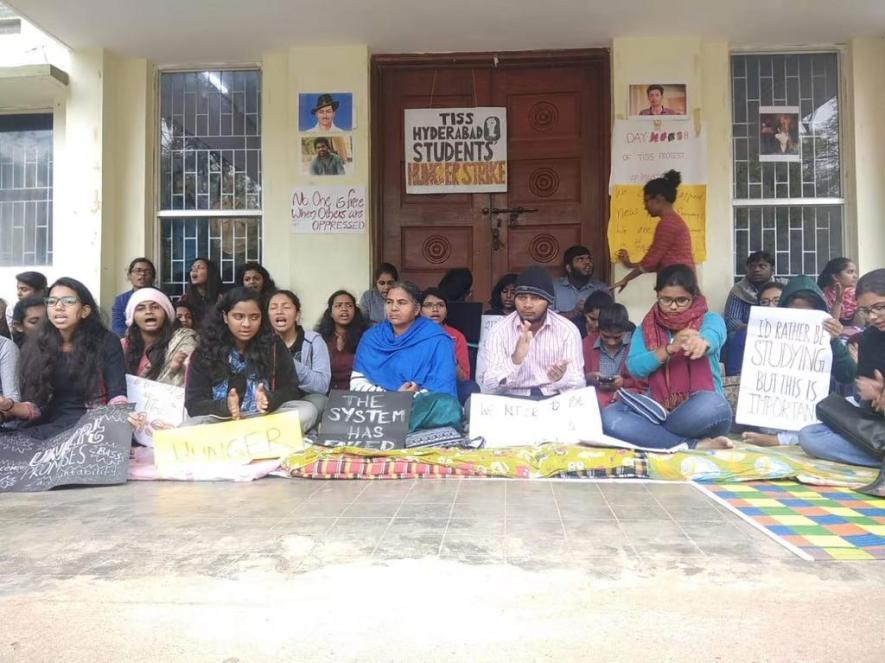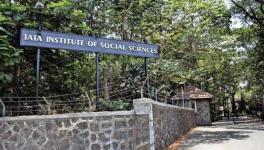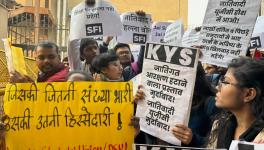TISS: Reimagining Futures or Succumbing to Neoliberal and Right-Wing Politics?

A protest from December 2018 advocating for scholarships at TISS Hyderabad. Image credit: Krishnannath C
The Tata Institute of Social Sciences (TISS), a deemed university, is known for its critical social science and social work programmes at both the graduate and post-graduate levels, not only in India but globally. It is one of the oldest schools of social work in Asia.
Contrary to popular belief, TISS is not part of the Tata Group. While it was founded by the Tatas, it has been a fully public institution operated under the University Grant Commission (UGC) since the 1960s. Over the years, TISS has earned its reputation as a premier institution for social science education, with its students making significant contributions across various fields.
However, today, TISS is losing its essence, increasingly aligning its academic programmes with extreme neoliberal market orientations. This is deeply concerning, as it reflects a growing distance from contributing to India's poorest communities, who predominantly come from the most impoverished regions, lower caste backgrounds, and Adivasi and other religious minorities.
In recent years, TISS has faced severe funding cuts, as per the administration's narrative, which has intensified further since the formation of the Bharatiya Janata Party (BJP) government at the Centre in 2014. The institute has consistently experienced cuts to its UGC (University Grants Commission) grant and has not received funds for the GOI-PMS (post-matric) scholarship. These issues have directly impacted marginalised students, especially from Scheduled Castes (SC), Scheduled Tribes (ST), and Other Backward Classes (OBC) backgrounds, who traditionally benefited from fully funded programmes at TISS. The withdrawal of scholarships forced many students to abandon their aspirations of joining one of the country’s finest social science programmes.
This became especially evident during the February 2018 protests across all TISS campuses. The administration's arbitrary decision to withdraw funding for GOI-PMS students—who were already enrolled—sparked widespread outrage. For instance, this writer joined the BA-MA integrated five-year programme for the academic year 2016-2021. At the time of admission, TISS assured us that we only had to pay the registration fee each semester. However, in the second year, the administration informed us that the scholarship was being withdrawn. The protests, led by the Joint Action Committee (JAC), particularly at the Hyderabad campus (where this writer was involved), aimed to reinstate full funding for future batches as well, but the administration only conceded to covering the then-current batch (2017-2022).
Another troubling trend has been the drastic reduction of students from the Northeast, who are predominantly from ST (Indigenous) backgrounds. Their representation in the master's programmes at TISS Hyderabad has dropped from double digits to single numbers.
Similarly, marginalised students from SC and ST backgrounds have increasingly had to resort to private loans or fund-raising efforts to afford admission. Those who cannot access such resources are left with no choice but to forgo their education at TISS. This reflects the institution’s gradual distancing from constitutional affirmative mandates.
A TISS doctoral student, who wished to remain anonymous, shared that “TISS wants to steal grants in the name of SC-ST students by setting up Dalit-Tribal (Indigenous) centres or departments to do research, but they don't want these students from Dalit-Adivasi background to take part of that knowledge system with fair process if this is not what is a colonial system which thrives with their hegemony on the oppressed lives”.
In addition to the funding and scholarship issues, other concerns have emerged that threaten the very foundations of academic freedom at TISS.
In recent years, TISS has launched collaborative dual degree programmes in partnership with prestigious institutions abroad, including Monash University, SciencesPo in Paris, and Queen's University in the UK. While these programmes aim to provide valuable educational opportunities, they raise significant concerns about accessibility and equity within a country marked by deep systemic caste, class, and religious marginality.
One of the most troubling aspects of these dual degree programmes is the requirement for a minimum of 60% marks for admission. This criterion not only contradicts the guidelines set by the UGC but also disproportionately affects students from marginalised communities, such as STs, SCs and OBCs. This criterion systematically excludes the caste-oppressed population from accessing higher education opportunities.
Moreover, the financial implications of these programmes are staggering. The application fee alone is ₹8,200, which can be a significant burden for students from low-income backgrounds. The tuition fee for the dual degree programme at TISS is ₹4,10,000 for the first year in India, and students are expected to pay approximately ₹20 lakh for the second year at Monash University or other universities. Such exorbitant costs are prohibitive, particularly for students from economically disadvantaged backgrounds, making it nearly impossible for them to pursue these programmes.
Even if SC and ST students manage to gain admission, the lack of clear financial support guidelines for marginalised students raises further questions about TISS's commitment to social justice.
This writer’s attempts to seek clarification through the Right to Information (RTI) Act went unanswered within the mandated 30-day period, highlighting a troubling lack of transparency from an institution that is supposed to examine social problems and advocate for accountability.
This absence of clarity and unresponsiveness suggests that TISS may be prioritising the needs of elite students over those from the marginalised communities, thus perpetuating epistemic inequities. The current direction TISS is taking, which appears to favour the privileged few, is concerning, particularly for a publicly-funded university.
Furthermore, recent reports indicate a troubling trend of stifling academic freedom and suppressing student voices and collective. This pattern aligns with a broader ecosystem of Right-wing majoritarian politics, raising alarms about TISS’s commitment to its foundational values of social justice and democratic engagement.
In conclusion, TISS's dual degree programmes, while ambitious, must be critically examined for their implications on access, equity, and social justice in the context of systemic caste, class, and religious marginality. Also, it is not clear how the programme includes the implementation of the reservation policy. If TISS is to uphold as a publicly-funded university to constitutional mandate and values, it must ensure that its educational offerings are inclusive and supportive of all students, particularly those from marginalised backgrounds, rather than catering to the elite in an extremely unequal society.
The writer is a first-generation post-graduate Tribal scholar from Telangana and a former Government of India National Overseas Scholarship Fellow at the International Institute of Social Studies, The Hague. He previously graduated from TISS Hyderabad. The views are personal
Get the latest reports & analysis with people's perspective on Protests, movements & deep analytical videos, discussions of the current affairs in your Telegram app. Subscribe to NewsClick's Telegram channel & get Real-Time updates on stories, as they get published on our website.
























